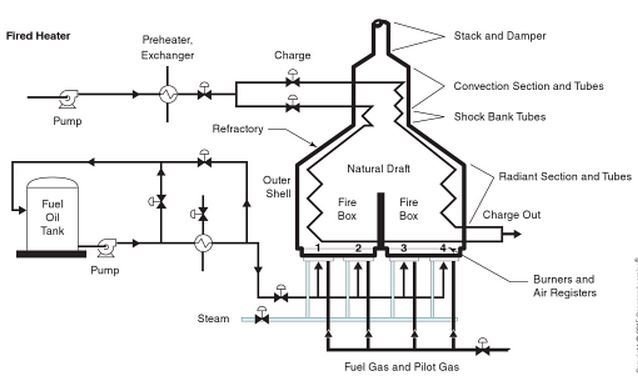INDUSTRIAL FURNACE
Adib, Ben Jong Kook, Farouk, Ainul, Kamilia Amelia, Fazlein
FURNACE
- Fire heater/furnace is a device used to heat up the chemical mixtures and used for high temperature heating.
- Transfer of heat generate by the combustion of natural gas, ethane, propane, and fuel oil.
- Used in crude processing, cracking, olefins production and many processes.
- Heat up raw materials- can produce product such as gasoline, oil, kerosene, chemicals, plastic and rubber.

Text
Text
Furnace vs Oven
Can be categorized as:
- Natural draft
- Forced-air
- Forced draft
- Condesing
CABIN FURNACE
-
a cabin-shaped, aboveground furnace that transfers heat primarily through radiant and convective processes.
-
The radiant section in a cabin furnace is designed to contain the flames while avoiding direct contact with the tubes.
-
The radiant section is engineered to distribute the radiant heat evenly. Modern burner design consumes 100% of the fuel with a nominal excess of 10 to 15% oxygen.
-
Excess oxygen in the furnace is carefully controlled as it enters the base of the furnace.
-
This control takes place as the fuel and primary air mix at the burner and is enhanced by adjustments on the secondary air registers mounted on the outside of the burner.
-
An oxygen monitor carefully tracks the composition of the hot combustion gases. Adjustments to the airflow rate are made at the burners and the stack damper.
COMMON PROBLEMS & SOLUTIONS

Pros
- The process coil can always be drained.
- Two-phase flow problems are less severe (slug flow can generally be avoided).
- Can accommodate side-firing or end-firing burners instead of only vertically upward firing.
- Highly efficient, ranging from 90 to 95%.
Cons
- Require vertical radiant tubes to carry the process stream from high to low areas of low heat flux several times in each pass
- There are bare end walls without any radiant tubes
- Require a large plot plan area
- Have a very low tube to structural steel weight ratio

Thank You
deck
By mirdzamurhan
deck
- 311


